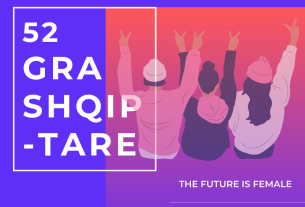When Elizabeth Gowing visited a Roma community on the outskirts of Pristina in 2011, I don’t think she could have imagined that eight years later, she would be part of something rather incredible.
Having moved to Kosovo a little over 12 years ago, she had been involved in a number of small charity based projects. One day, she took some bags of donated items to distribute amongst some of the poorest families in the area.
“I had been living in Kosovo for four years at the time, but I had never seen poverty like I did in this community”, she tells me over a cup of tea in a colourful Tirana cafe.
As she was in the process of handing over a bag full of plates and other items, a young woman came running out of the house, clutching her three-year-old child in her arms. She pulled down the infants tracksuit bottoms and revealed horrific burns that covered the lower part of his body and legs. The woman pleaded with Elizabeth to help her and her son, but not knowing what to do and having no medical training, she walked away.
“But I didn’t get very far,” she said, smiling.
Hesitant to just to hand over money, instead she called up a doctor she knew and asked him what to do. The doctor decided that the child was too young to have the operation that was needed, but that the damaged skin needed treatment with a medicated cream that would keep it supple in the meantime. Costing EUR 10 a tube, it was far out of the financial reach of the woman and her family, so Elizabeth bought a tube of the cream and instructed her to call when it ran out so she could come back and replace it.
Each week she would receive a phone call, and as promised, she would return to the woman’s house to replace the cream. With each visit she made, the family started to open up to her more and more- offering her tea, inviting her into their home, and introducing her to members of their large family. Upon meeting some of the slightly older children, Elizabeth enquired as to why they were not in school. The parents replied that this was due to the fact that the children did not have any shoes.
“I was skeptical and I said ‘are you honestly telling me that if I got you shoes, you would send them to school?’ and they said yes!”, she explained.
So she bought them some shoes and explained that they were not a gift, but rather a part of a deal- their part being that when she returned in two weeks she wanted to see proof that they had attended school. They were and still are to this day. Just as they had insisted, it really was just the issue of a lack of shoes.
But one of the older children, around the age of 9 told Elizabeth that she wasn’t in school because it was “too late for me”. Confused by this because under Kosovar law, all children are required to attend school, she went to visit the director of the local school. There she was told in no uncertain terms that yes, the little girl was correct- by 9 years old they are considered “too hard to teach” and must past a test in order to be accepted.
Elizabeth was furious and frustrated and returned to the little girl and told her that she would teach her to pass the test. The girl was delighted but asked one single question which was to change the course of events from that moment on; “can some of my friends come?”
Before Elizabeth knew it, one child became 21 and 21 turned into 62. She found herself taking 6 months off her work to dedicate her time to teaching these children to pass the test they needed to be accepted into school. As well as teaching, she spent a lot of time raising awareness of the situation- blogging, mobilising volunteers, campaigning, media appearances- and before long she got a call from the Prime Minister who told her- “yes these children have to go to school”.
“It grew beyond what I had ever imagined. Of course there were times I thought we would not make it, but we did. All 62 children got into school in the end.”
But this was not the end of the story. Whilst the children were accepted into school, it became clear that the schools did not want them there. Not only were the children still behind in their studies but some were turned away because they “had fleas” (they didn’t) and others were told that they were “too big for the furniture”. Some Albanian parents complained that they didn’t want their children mixing with them, but Elizabeth was persistent and tells me that things have now changed. A little bit at least.
Fast forward to 2019 and Elizabeth’s NGO ‘The Ideas Partnership’ is active in 5 municipalities in Kosovo. They have also branched out into healthcare to try and combat the terrible child mortality statistics within these communities. They work with expectant mothers to get them to give birth in hospital instead of home, and they provide transport to hospital so they can have blood tests and ultrasounds. They also hand out baby packs to new parents which include blankets that are knitted and crocheted by volunteers back in the UK.
They set up two kindergartens, each of which receives around 50 children per day, and they run weekend activities for the older children to supplement their time at school. Music classes and even rugby are on the agenda for those that want to take part.
In addition to this, bursaries are offered to those that want to go back to school or pursue adult learning. There is no charge for these services but those that avail themselves are expected to “pay it back” by volunteering in their community. By helping others to help themselves and help others in need, Elizabeth and her volunteers hope to create a truly sustainable society.
Today, The Ideas Partnership is the second largest voluntary organisation in Kosovo with over 100 volunteers comprising of a pretty equal split between Kosovar Albanians, foreigners, and members of the ethnic community.
One of the projects that came out of the organisation is called “Sa Pune”. A social enterprise that is registered as a business, it involves eight women from the community who are allowed to take part on the condition that their children go to school.
“We wanted to be able to give them the means to break the cycle of not sending their children to school”.
Rather than sending the children out to beg, they go to school whilst the mothers make crafts and artisan goods which are then sold, with them retaining the money. Of course, along the way Elizabeth has had to be harsh with her rules and some have had to leave the project, but on the whole it has been a success.
She explains “I know it is tempting but don’t give money to children on the street. If you give them money, the parent will decide not to send their child to school because they are worth more on the street. This makes me passionate not to give money to street children.”
“Many want to go to school and do want the help, but they don’t feel that they have a choice. Instead of going to school, older children end up rubbish picking with parents t make money.”
So where does the money to fund their projects come from?
“Up until now we haven’t had a cent from the government. We have had a meeting with a local Mayor who said he will give us some ongoing support, but nothing concrete has happened yet”, she tells me.
Last year, EUR 60,000 of their EUR 160,000 budget came from private donations. Some give a small amount each month, whilst other donations are on a one-off basis.
“We never know how much we will get each month, but we try our best- we always have enough money to last for the next three months, and that is about it!”
As the interview comes to an end, Elizabeth explains to me that one of the key motivators behind the work she does is seeing the way that attitudes are changing. In addition to this, she loves the way in which it has brought members of the Albanian community together with these ostracised communities. She tells me she gets a sense that it matters to the volunteers and the people that they help and that through this, perceptions are starting to change.
“I like to fill my Facebook feed with pictures of success stories, not of poor children”, she states with her unmistakeable air of positivity and optimism.
Sa Pune will have a stall at the upcoming Spring Bazaar on Saturday 11 May. You can check out their Facebook page here.

